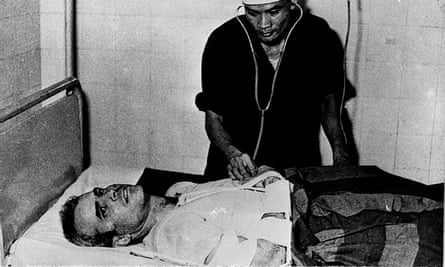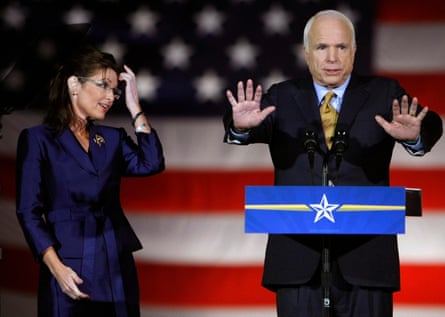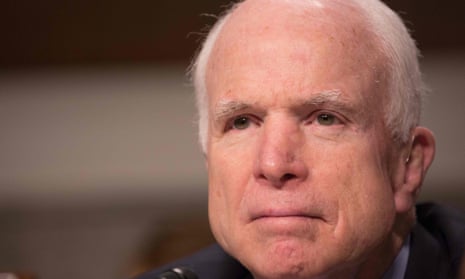When Jim Kolbe visited John McCain at his Arizona ranch recently, he found his longtime friend in good spirits, eager to talk about the news of the day: Syria and North Korea. The two men also reminisced about the trips they took together as members of Congress, when Kolbe served in the House.
“He’s a great practical joker and he likes to get a rise out of people,” said Kolbe, who has been on the receiving end of McCain’s ribbing for years.
McCain, 81, was diagnosed last summer with glioblastoma, an aggressive form of brain cancer. As he rests, he is reflecting on a remarkable life and career.
“It’s inconceivable that he will not continue in public service until the very end, until he can’t possibly do it any longer,” Kolbe said. “That’s just who he is.”
In a book and a HBO documentary to be released this month, McCain reckons with history, recounting major episodes from his 60 years in service – 35 as a member of Congress after nearly as many in the US navy. He recounts some of his biggest political battles – over campaign finance, in search of a bipartisan solution on immigration, and to restrict the CIA’s use of torture – and defends his most controversial decisions. In what may be his last act, this “son and grandson of navy admirals” mounts an impassioned defense of the worldview he has championed – a worldview under attack in the era of Donald Trump.
McCain makes the case for an international order shaped by American leadership, free trade and a welcoming stance towards immigrants and refugees. He denounces Trump’s nationalistic impulses and condemns his apparent affinity for autocratic leaders, Vladimir Putin above all.
“John McCain is not fighting a losing battle,” said Jon Kyl, a former Arizona senator and close friend. “His view has been the dominant view of American foreign policy since [the second world war] and it remains a key part of Republican orthodoxy generally. His views still predominate.”
‘Another scrap or two’
Though McCain has been absent from Washington since December, he writes in his book that he “wouldn’t mind another scrap or two for a good cause before I’m a memory”. This week, he duly urged colleagues to reject Gina Haspel, Trump’s nominee to lead the CIA, over her role in the agency’s past use of torture. The issue is personal for McCain, who was brutally tortured during more than five years as a prisoner of war in Vietnam.

“As I have argued many times, the methods we employ to keep our nation safe must be as right and just as the values we aspire to live up to and promote in the world,” McCain said in a statement, in which he said Haspel’s refusal to condemn torture as immoral was “disqualifying”.
Her confirmation vote will show whether McCain can persuade other senators to act on matters of conscience. After McCain announced his opposition, his closest friend in the Senate, Lindsay Graham, said he would vote in favour.
McCain has built a reputation as a conservative who is willing to work with liberals. This “independent streak”, as friends call it, has earned praise and criticism. On immigration, McCain has been accused of moderating his views in the face of challenges from the right. During the Republican primary in 2008, his opponents used his relatively liberal stance as a cudgel. He hopes to make one last go at immigration reform, he writes, noting a bill he has sponsored with Democrats.
During his visit to McCain’s ranch, Kolbe said, the two men watched a rough cut of the forthcoming HBO documentary. Kolbe said he was struck by how few regrets McCain was willing to entertain. He has, though, had a few.
He has admitted that he has sometimes struggled to live up to his own calls for compromise, reason and moderation. “Sometimes I’ve let my passion rule my reason,” he said in a speech last July. “Sometimes I made it harder to find common ground because of something harsh I said to a colleague.”
In his memoir, he writes that he would like “see our politics begin to return to the purposes and practices that distinguish our history from the history of other nations” and for Americans to thereby “recover our sense that we are more alike than different”.
But for many, McCain’s appeals for civility clash with his choice of then Alaska governor Sarah Palin as his running mate in 2008, a decision that even some in his own party now believe helped release the tide of populism, anti-elitism and nativism that would drive the rise of Trump. In his book, McCain says he made a “mistake” in not choosing Joe Lieberman, a Democrat-turned-independent former senator and close friend, as his vice-presidential pick. But he also defends Palin’s performance and praises her resilience.
In the HBO documentary, according to Kolbe, the senator also discusses his reluctance during his presidential run in 2000 to call for the removal from the South Carolina state house of the Confederate battle flag. After his defeat, McCain apologized for what he called “a sacrifice of principle for personal ambition”. He also, Kolbe said, addresses his involvement in the Keating Five affair, a banking scandal of the late 1980s that nearly derailed his political career.
“A legislator in a way you don’t see any more”
Debate over McCain’s legacy is taking place alongside a discussion of his succession – who will replace him as a senator, and how.
Should McCain – or the junior senator from Arizona, Jeff Flake – die or resign before the end of May, the office of the Arizona secretary of state has said there will likely be a special election. If the seat is vacated in June, Governor Doug Ducey, a Republican up for re-election this year, will appoint someone to serve until 2020.
Facing stiff tests nationwide, including a competitive race to replace the retiring Flake, Republicans would prefer an appointment. The outcome could affect control of the Senate. After it was announced recently that McCain had been hospitalized with an intestinal infection, Republican state lawmakers sought to bring the appointment deadline forward.
McCain’s family and allies, though, are refusing to engage in speculation. “Contrary to popular belief @SenJohnMcCain is doing fine and has no intention of resigning! #crackpots,” Cindy McCain, the senator’s wife, wrote on Twitter in March.Intimates have also reportedly told the White House that McCain does not want Trump at his funeral. NBC has reported that Barack Obama and George W Bush are lined up to speak.

Richard Fontaine, a foreign policy adviser to McCain in 2008, said the senator would “be remembered for how most of the time he’s occupied a unique spot in the political spectrum, taking a leadership role in bridging a lot of political divides, both in the Republican party and with Democrats. He’s been a legislator in a way you don’t see any more”.
Fontaine visited McCain recently. He said his former boss was eager to look back – way back. They talked about the Battle of Borodino, of 1812; of Napoleon’s siege of Moscow; about Stalin’s “show trials”; and about Ulysses S Grant, commanding general of the Union army during the civil war, post-war president and subject of a major new biography.
“He has the perspective of time,” Fontaine said. “Both his own long life and the sense of history. I don’t know how many senators would sit and talk about the Battle of Borodino. He knows none of these things are set in stone and, at the end of the day, it’s up to individuals to make decisions, to set the direction of the country.
“He remains very optimistic about the future of this country. He just wishes we were all on the same page.”
